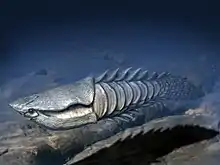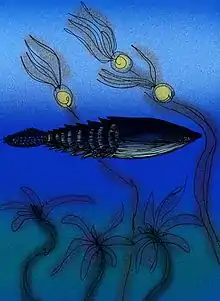Anglaspis
Anglaspis is an extinct genus of cyathaspidiform heterostracan agnathan. Fossils are found in marine strata of Europe, from the late Silurian period until genus' extinction during the Early Devonian. As with other cyathaspidiforms, individuals of Anglaspis had dorsal and ventral plates covering the forebody, gill pouches, and nasal openings that lay on the roof of the oral cavity.[1]
| Anglaspis | |
|---|---|
 | |
| Restoration of Anglaspis heintzi | |
| Scientific classification | |
| Kingdom: | |
| Phylum: | |
| Class: | |
| Subclass: | |
| Order: | |
| Suborder: | |
| Family: | |
| Genus: | Anglaspis |

Late Silurian species of Anglaspis are found in marine strata of Wales and England, while most of the Early Devonian species are found in the Devonian-aged strata of Spitsbergen island, in Svalbard, Norway.[2]
Taxonomy
Anglaspis was, at various times, placed in the families Cyathaspididae,[3] Poraspididae,[4] and in its own family, Anglaspididae. Currently, it is placed in Ariaspidae with Ariaspis, and Listraspis, and is considered to be closely related to, if not the progenitor of Liliaspis and Paraliliaspis.[5]
References
- Watson, David Meredith Seares (1954-10-28). "A Consideration of Ostracoderms". Phil. Trans. R. Soc. Lond. B. 238 (652): 1–25. doi:10.1098/rstb.1954.0004. ISSN 0080-4622.
- "Anglaspis sp. - Naturhistorisk museum". Natural History Museum at the University of Oslo (in Norwegian). Retrieved 2018-11-26.
- Ilyes, Robert R.; Ohta, Yoshihide; Guddingsmo, Jonny (1995-01-06). "The Downtonian and Devonian vertebrates of Spitsbergen. *. New Heterostracans from the Lower Devonian Red Bay Group, northern Spitsbergen". Polar Research. 14 (1): 33–42. doi:10.3402/polar.v14i1.6649. ISSN 1751-8369.
- Denison, Robert Howard (24 April 1964). "The Cyathaspididae; a family of Silurian and Devonian jawless vertebrates". Fieldiana: Geology. 13: 428.
- Mette, Lundgren; Henning, Blom (2011). "Phylogenetic patterns in the heterostracan families Cyathaspidae, Ariaspidae and Ctenaspidae". DIVA: 16–17.